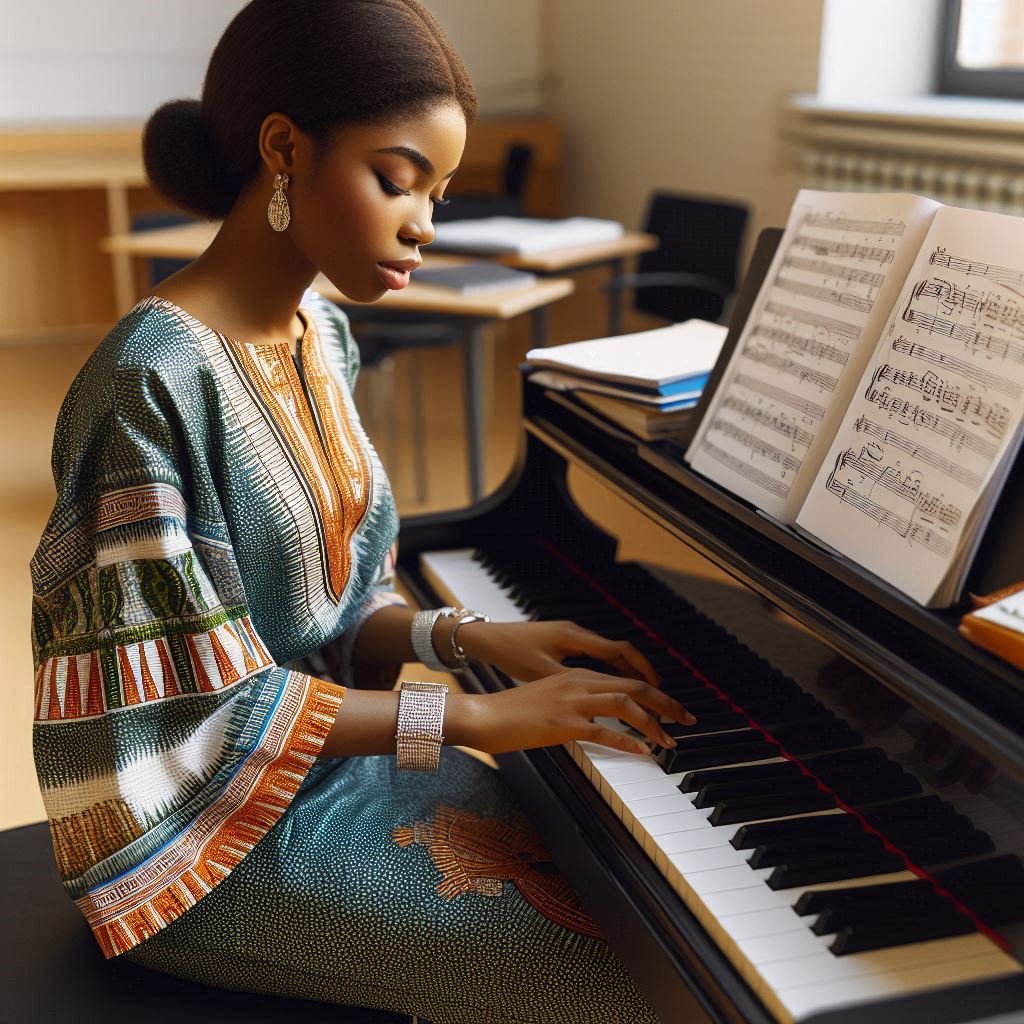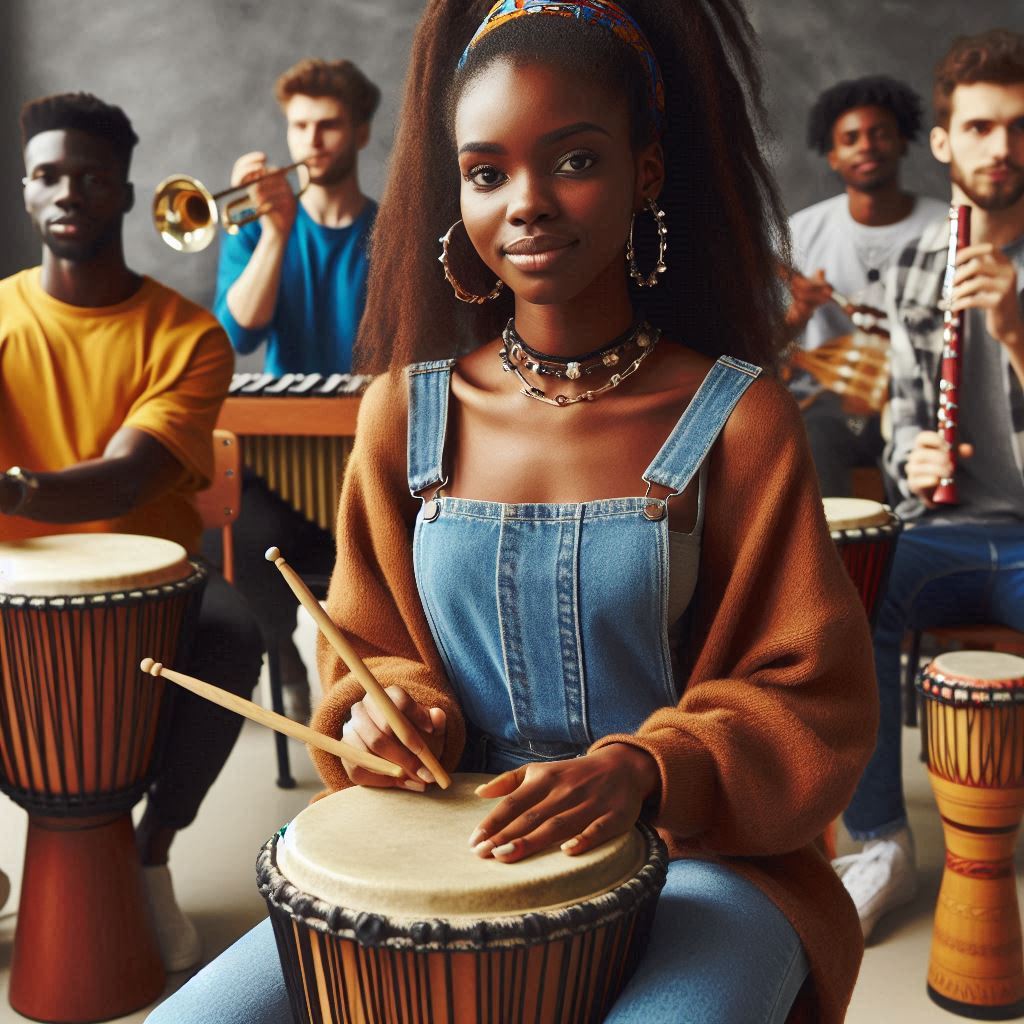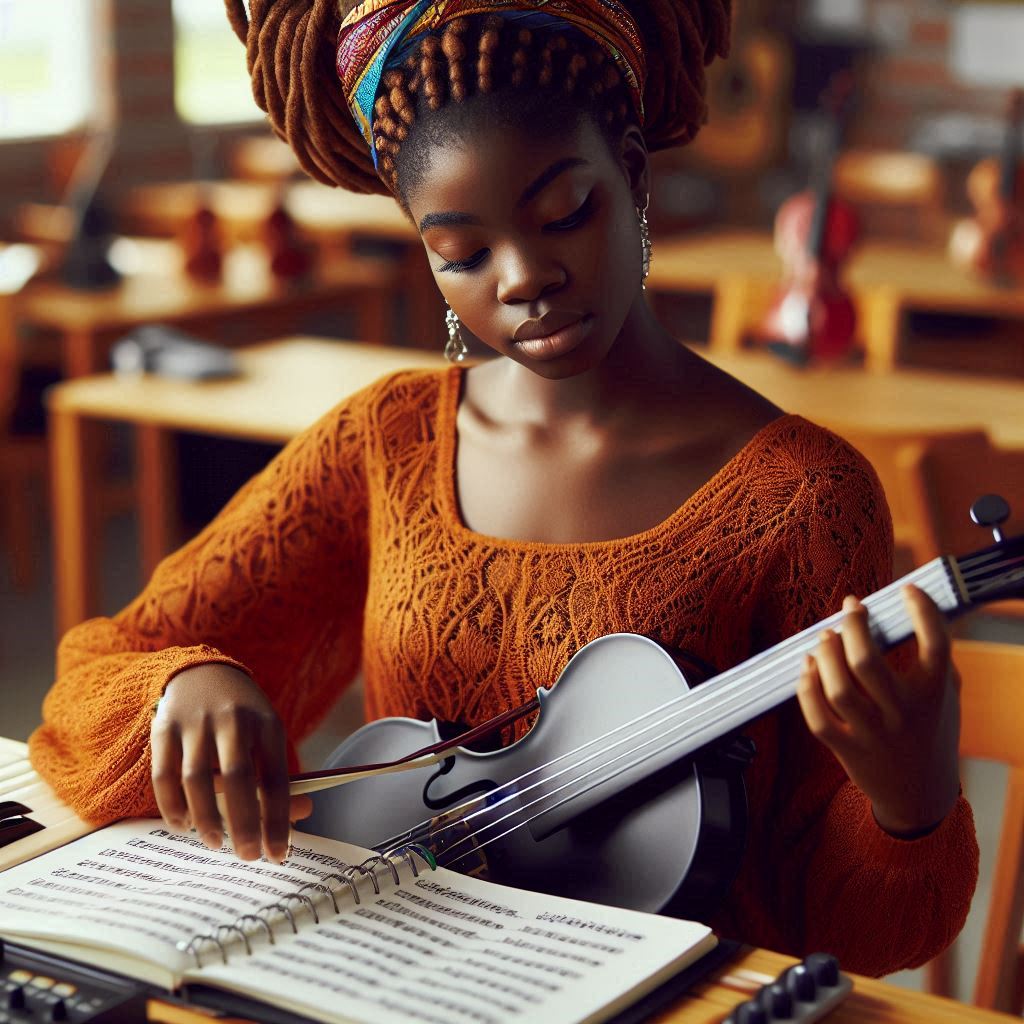Introduction
Music education holds immense importance in Nigeria, playing a crucial role in nurturing talent and preserving the country’s rich cultural heritage.
Nigerian music schools provide structured programs that combine traditional and contemporary music education.
These institutions are essential in shaping the next generation of musicians, ensuring they are well-equipped with the necessary skills and knowledge.
Numerous music schools across Nigeria offer comprehensive music education programs.
Institutions like the Muson School of Music, Lagos, and various universities with dedicated music departments, such as the University of Nigeria, Nsukka, and Obafemi Awolowo University, provide students with extensive training.
These programs cover music theory, practical skills, and performance, ensuring a well-rounded musical education.
Understanding the curriculum of these music schools is vital for aspiring musicians.
A detailed knowledge of the curriculum helps students make informed decisions about their education.
It ensures they select programs that align with their interests, career goals, and musical aspirations.
This understanding is crucial for their personal and professional development.
History of Music Education in Nigeria
Brief History of Music Education in Nigeria
Music education in Nigeria has a rich and dynamic history. It began with traditional oral instruction, where elders and master musicians taught younger generations through direct demonstration and practice.
These early forms of music education were integral to cultural rituals, ceremonies, and storytelling.
Formal music education started in the 19th century with the establishment of mission schools by European missionaries.
These schools introduced Western music education, emphasizing hymns, choral music, and basic music theory. The integration of Western musical elements marked the beginning of structured music education in Nigeria.
Evolution of Music Schools in the Country
The evolution of music schools in Nigeria has been remarkable. In the early 20th century, schools like St. Gregory’s College and King’s College Lagos started offering music as part of their curricula. These institutions laid the groundwork for more specialized music education.
Post-independence, the government and private sector invested in expanding music education. Universities such as the University of Nigeria, Nsukka, and Obafemi Awolowo University established music departments.
These universities offered degrees in music, combining traditional African music with Western classical and contemporary styles.
Additionally, specialized music schools emerged, such as the Muson School of Music in Lagos.
Founded in 1989, Muson has been instrumental in training musicians through comprehensive programs that include performance, theory, and music technology. The school has produced many of Nigeria’s prominent musicians.
In recent years, music schools have embraced modern technologies and diverse genres, reflecting Nigeria’s vibrant music scene.
Institutions now offer courses in music production, sound engineering, and contemporary genres like Afrobeat and hip-hop. This evolution mirrors global trends and Nigeria’s unique musical identity.
Significance of Music Education in Nigerian Culture
Music education holds significant cultural importance in Nigeria. It preserves and promotes the country’s rich musical heritage, encompassing traditional, folk, and modern styles.
Through music education, students learn about Nigeria’s diverse cultural history and musical traditions, fostering a sense of national identity and pride.
Moreover, music education contributes to the social and emotional development of students. It enhances creativity, critical thinking, and emotional expression. Music programs in schools encourage collaboration, discipline, and perseverance, which are valuable life skills.
Music education also plays a crucial role in Nigeria’s economy. The Nigerian music industry is one of the largest in Africa, generating substantial revenue and providing numerous job opportunities.
By equipping students with musical skills and knowledge, music education supports the industry’s growth and sustainability.
Basically, music education in Nigeria has evolved from traditional oral instruction to comprehensive programs offered by specialized schools and universities.
This evolution reflects the importance of music in Nigerian culture and its significant role in preserving heritage, fostering personal development, and supporting the music industry.
Music education continues to be a vital component of Nigeria’s educational landscape, nurturing the next generation of musicians and cultural ambassadors.
Accredited Music Schools in Nigeria
When it comes to pursuing a music education in Nigeria, it is important to choose an accredited music school.
Accreditation ensures that the school meets certain standards of quality and provides a curriculum that is recognized and respected in the industry.
Below is a list of recognized music schools in Nigeria, along with details about each school’s curriculum and the importance of choosing an accredited institution.
List of Recognized Music Schools in Nigeria
- MUSON School of Music
- Tenstrings Music Institute
- PeterKing College of Music
- Tenola Music School
- Musical Society of Nigeria (MUSON) Conservatoire
Details about Each School’s Curriculum
- MUSON School of Music: Offers a comprehensive music curriculum that includes theory, practical lessons, ensemble playing, and performance opportunities.
- Tenstrings Music Institute: Provides training in various aspects of music, including vocals, instruments, music production, and music business skills.
- PeterKing College of Music: Focuses on jazz and contemporary music education, offering courses in performance, composition, and music theory.
- Tenola Music School: Specializes in teaching traditional African music and instruments, as well as modern music styles and production techniques.
- Musical Society of Nigeria (MUSON) Conservatoire: Offers a conservatory-style music education with a strong emphasis on classical music training and performance.
Importance of Choosing an Accredited Music School
- Recognition and Credibility: Graduating from an accredited music school gives you credibility in the industry and enhances your career prospects.
- Quality Education: Accredited schools adhere to standards of excellence, ensuring that you receive a high-quality education.
- Industry Connections: Accredited schools often have partnerships with music industry professionals and organizations, providing networking opportunities for students.
- Transferability of Credits: If you decide to pursue further education or transfer to another school, credits earned at an accredited institution are more likely to be recognized.
- Access to Resources: Accredited music schools offer access to state-of-the-art facilities, instruments, and faculty members who are experts in their field.
Overall, choosing an accredited music school in Nigeria is crucial for your music education and career advancement. By enrolling in a recognized institution with a strong curriculum, you can gain the skills, knowledge, and connections necessary to succeed in the music industry.
Curriculum Overview of Music Schools
Detailed Breakdown of the Curriculum Offered by Music Schools in Nigeria
Nigerian music schools offer comprehensive curricula designed to cultivate well-rounded musicians. These programs integrate theoretical knowledge, practical skills, and performance experience.
The curriculum is structured to provide a solid foundation in music while allowing students to explore various specializations and electives.
Core Subjects Taught in Music Education Programs
Core subjects form the backbone of music education programs in Nigerian music schools.
Music theory is fundamental, covering notation, harmony, counterpoint, and form. Students learn to read, analyze, and compose music, developing a deep understanding of musical structure.
Music history is another crucial component, tracing the evolution of music from ancient times to the modern era. This subject explores different musical periods, styles, and influential composers, enriching students’ contextual knowledge.
Practical musicianship is heavily emphasized. Students receive training in voice and instrumental performance, honing their technical skills and artistic expression.
This training includes individual lessons, ensemble playing, and participation in choirs or orchestras.
Aural skills are also integral, teaching students to identify pitches, intervals, rhythms, and chords by ear. This enhances their ability to understand and interpret music accurately.
Additionally, music schools offer courses in composition and arranging. These classes encourage students to create original works and adapt existing pieces, fostering creativity and innovation.
Specializations and Elective Courses Available to Students
Beyond core subjects, Nigerian music schools provide specializations and electives to cater to diverse interests and career goals. Students can choose to specialize in areas such as performance, music education, music technology, and ethnomusicology.
Performance specialization focuses on advanced techniques and repertoire for a chosen instrument or voice. Students engage in intensive practice, masterclasses, and recitals, preparing them for professional performance careers.
Music education specialization trains students to become effective music teachers. Courses cover pedagogy, curriculum development, and classroom management, equipping future educators with the skills to inspire and instruct the next generation.
Music technology specialization delves into the technical aspects of music production. Students learn about recording, mixing, mastering, and sound design, gaining hands-on experience with industry-standard software and equipment.
Ethnomusicology specialization examines the cultural and social contexts of music. Students study traditional and contemporary music from various cultures, exploring the role of music in society.
Read: Integration of Cultural Studies in Nigerian Curriculum
Instrumental Training
Importance of Instrumental Training in Music Education
Instrumental training is crucial in music education, providing students with the technical skills and artistic expression necessary for musical mastery. Playing an instrument fosters discipline, patience, and concentration, qualities that benefit students in all areas of life.
Instrumental training enhances cognitive abilities, improving memory, coordination, and spatial-temporal skills. Students develop a deeper understanding of music theory and practice through hands-on experience with their instruments.
Moreover, learning an instrument encourages emotional expression and creativity. Students can convey emotions and stories through their music, fostering a deeper connection to their art and audience.
Information About the Different Types of Instruments Offered for Training
Nigerian music schools offer training in a wide range of instruments, catering to diverse musical interests and traditions.
Students can choose from string instruments like the violin, viola, cello, and double bass. These instruments are essential in both classical and contemporary music.
Wind instruments such as the flute, clarinet, saxophone, and trumpet are also available. These instruments are prominent in orchestras, bands, and jazz ensembles, offering students versatility in their musical pursuits.
Keyboard instruments, including the piano and organ, form a fundamental part of music education. These instruments provide a strong foundation in harmony and melody, essential for composition and performance.
Percussion instruments, like the drums, xylophone, and various ethnic drums, are integral to rhythm training. They are vital in traditional African music and contemporary genres, providing students with a rich rhythmic foundation.
Additionally, guitar and bass guitar training is offered, appealing to students interested in rock, jazz, blues, and popular music. These instruments are versatile and widely used across many music styles.
Traditional Nigerian instruments, such as the talking drum, udu, and kora, are also included in the curriculum. This inclusion helps preserve and promote Nigeria’s rich musical heritage, allowing students to explore indigenous sounds and techniques.
Overview of the Level of Proficiency Students Can Expect to Achieve
Students in Nigerian music schools can expect to achieve a high level of proficiency with dedicated practice and instruction. Beginners start with fundamental techniques and gradually progress to more advanced skills and repertoire.
Intermediate students build on their foundational knowledge, exploring more complex pieces and techniques. They develop greater technical proficiency, musicality, and performance confidence.
Advanced students achieve professional-level skills, capable of performing challenging compositions and engaging in complex musical interpretations. They gain expertise in their chosen instruments, preparing them for careers as performers, educators, or composers.
Students also participate in ensembles and orchestras, enhancing their ensemble playing and collaborative skills. Regular performances and recitals provide valuable experience and build stage confidence.
Therefore, instrumental training in Nigerian music schools is a vital component of music education. It offers students the technical skills, artistic expression, and performance experience necessary for musical success.
By providing training in a variety of instruments and fostering high levels of proficiency, these programs equip students to excel in their musical endeavors and contribute to Nigeria’s vibrant music scene.
Read: Sociology Departments in Nigerian Universities
Transform Your Career with Expert Guidance
Get personalized mentorship consulting that’s tailored to your unique path. Our expert advice is actionable and exclusive.
Get StartedVocal Training
Importance of Vocal Training in Music Education
Vocal training is a crucial aspect of music education as it helps in developing and enhancing vocal abilities. It teaches students proper techniques for singing, breathing, and maintaining vocal health.
Without proper vocal training, singers may face vocal strain, fatigue, and even long-term damage to their voices.
Different Vocal Techniques Taught in Music Schools
Music schools offer a variety of vocal techniques to students to help them improve their singing skills. These techniques include breathing exercises, pitch control, vocal range expansion, articulation, and phrasing.
Students also learn how to interpret and express emotions through their vocals, as well as vocal warm-up routines to prepare their voices for performances.
Opportunities for Performance and Practice in Vocal Training Programs
Music schools provide students with opportunities to showcase their vocal talents through performances, recitals, and competitions.
These programs allow students to apply their vocal training in real-life situations and gain valuable experience performing in front of an audience. Additionally, students have access to practice rooms and facilities where they can hone their vocal skills outside of class time.
By focusing on vocal training, music schools equip students with the necessary skills and techniques to become proficient singers, whether they pursue a career in music or simply enjoy singing as a hobby.
Read: Prominent Nigerian Sociologists and Their Contributions

Music Theory
Significance of Music Theory in a Musician’s Education
Music theory is essential in a musician’s education, providing the foundation for understanding and creating music.
It helps musicians comprehend the structure and language of music, enabling them to analyze, interpret, and compose effectively. Music theory fosters a deeper appreciation of musical works, enhancing both listening and performance skills.
Overview of Topics Covered in Music Theory Classes
Music theory classes in Nigerian music schools cover a wide range of topics. Students begin with the basics of notation, learning to read and write musical symbols. They study scales, intervals, and chords, understanding the building blocks of melody and harmony.
Rhythm and meter are also crucial components. Students learn to recognize and create various rhythmic patterns and understand how beats and time signatures shape music.
Harmony is another key area, where students explore chord progressions, modulation, and harmonic analysis. They learn how chords function within a key and how to use harmony to create tension and resolution in music.
Counterpoint, the art of combining independent melodic lines, is also taught. Students study the rules and techniques of counterpoint, learning how to create intricate and balanced compositions.
Form and structure are significant topics, where students analyze different musical forms, such as binary, ternary, sonata, and rondo forms. They learn how composers use these structures to organize their musical ideas.
Advanced topics may include orchestration, where students learn to write for different instruments and understand their unique characteristics. They also study contemporary music theory, exploring modern harmony, atonality, and other 20th and 21st-century techniques.
Relationship Between Music Theory and Practical Music Skills
The relationship between music theory and practical music skills is deeply intertwined. Understanding music theory enhances a musician’s ability to perform, compose, and improvise.
It provides the tools needed to read and interpret scores accurately, making learning new pieces more efficient and insightful.
In performance, music theory aids in phrasing, dynamics, and expression. Musicians with a strong theoretical background can make informed interpretative decisions, bringing a deeper level of artistry to their playing.
For composers, music theory is indispensable. It offers a framework for creating coherent and compelling music. Knowledge of harmony, form, and counterpoint allows composers to craft pieces that are both innovative and structurally sound.
Improvisation also benefits from a solid grounding in music theory. Musicians can improvise more effectively when they understand scales, chords, and progressions, allowing them to create spontaneous music that is both creative and harmonically correct.
Read: History of Sociology in Nigeria: A Comprehensive Overview
Performance Opportunities
Description of Performance Opportunities
In Nigerian music schools, students are provided with various performance opportunities to showcase their talent and skills. These opportunities range from solo performances to group collaborations, allowing students to explore different genres and styles of music.
Importance of Practical Experience
Practical experience is crucial in a musician’s education as it allows students to apply theoretical knowledge in real-life scenarios. By performing in front of an audience, students learn how to engage with listeners, manage stage fright, and refine their performance techniques.
Overview of Recitals, Concerts, and Other Performance Events
Nigerian music schools organize recitals, concerts, and other performance events to provide students with platforms to showcase their progress and achievements.
These events are not only beneficial for students’ musical development but also help them build confidence and stage presence.
Students participate in recitals where they perform pieces they have been working on under the guidance of their instructors.
These events are usually attended by faculty members, fellow students, and sometimes even external guests such as music industry professionals and potential employers.
Concerts are larger-scale events that may feature multiple performers and ensembles. Students have the opportunity to collaborate with their peers, showcasing their teamwork and ensemble skills.
These events often attract a wider audience, exposing students to different musical tastes and preferences.
In addition to recitals and concerts, music schools also organize other performance events such as masterclasses, workshops, and community outreach programs.
These events provide students with unique opportunities to learn from guest artists, industry experts, and experienced professionals in the field.
Overall, performance opportunities play a vital role in a student’s music education, helping them develop essential skills such as stage presence, communication, and musical expression.
By participating in recitals, concerts, and other events, students not only hone their craft but also gain valuable experience that prepares them for a successful career in the music industry.
Conclusion
Understanding the curriculum of music schools in Nigeria is crucial for aspiring musicians.
A well-rounded curriculum provides a solid foundation in music theory, practical skills, and performance.
It ensures that students gain a comprehensive understanding of music, which is essential for their growth and development as musicians.
Music education equips students with the necessary tools to excel in their musical careers.
It fosters creativity, critical thinking, and discipline, all of which are vital skills for success in the music industry.
Aspiring musicians should actively pursue music education to hone their talents and broaden their opportunities.
The structured approach offered by music schools allows students to explore various musical genres and techniques, enhancing their versatility and proficiency.
Nigerian music schools play a vital role in shaping future musicians.
They preserve cultural heritage by teaching traditional Nigerian music alongside contemporary styles.
This blend of tradition and modernity enriches students’ musical knowledge and appreciation, preparing them to contribute to Nigeria’s rich musical heritage.
Moreover, these schools provide a platform for students to engage with experienced instructors and industry professionals, offering valuable insights and mentorship.




